
The President’s Message:
Our Holiday meeting
will be on December 11, 2019 at 7:00 PM at our new meeting place: Lake
Clarke Shores Town Hall, 1701 Barbados Road, Lake Clarke Shores 33406.
Directions to the Town Hall:
1/ Exit I
95 at Forest Hill Blvd.; go westbound on Forest Hill Blvd.
2/ The
first traffic light is Pine Tree Lane.
Go to the second traffic light which is Florida Mango Road.
3/ Make a
left onto Florida Mango Road.
4/ Proceed
0.1 mile and turn left onto Barbados Road.
5/ Continue on Barbados
Road. Destination is on left.
The Police Building is on right and Town Hall on left.
Our program will be
given by noted author, Robert Macomber.
His topic will be,
Grog, the most famous drink afloat.
Desserts will be
served at the meeting.
Please save some of your appetite for holiday treats.
Please bring any era
history related books or small gift card to your favorite store or
restaurant. We will have a
raffle benefiting the Club for guest speakers.
Dues are due.
Gerridine LaRovere
December 11, 2019 Program:
 As
is usual for our holiday meeting, we have Robert Macomber back with us
again. Although most of us
are quite familiar with Bob, for our new members he is the author of the
“Honor” series of historical novels.
These books, and there are 15 of them at last count, tell the
story of the late 19th and early 20th century via the
fictional character of Peter Wake, USN. As
is usual for our holiday meeting, we have Robert Macomber back with us
again. Although most of us
are quite familiar with Bob, for our new members he is the author of the
“Honor” series of historical novels.
These books, and there are 15 of them at last count, tell the
story of the late 19th and early 20th century via the
fictional character of Peter Wake, USN.
Robert N. Macomber
has been the recipient of the Patrick D. Smith Literary Award, the
American Library Association’s W.Y. Boyd Literary Award, a Silver Medal
in Popular Fiction from the Florida Book Awards, and a host of other
accolades over two decades.
He has earned rare experiences like being Distinguished Lecturer at NATO
HQs [Belgium], and, for ten years, was invited into the Distinguished
Military Author Series, Center for Army Analysis [Ft. Belvoir].
His topic will be
Grog, the most famous drink afloat.
I have heard this presentation before and it is a winner.
You will learn the history of this libation, learn the fine art
of navy toasting, but sadly you will not get to sample the real stuff.
Town Hall is dry.
November 13, 2019 Program:
The November speaker
was your humble (well perhaps, not so humble) editor.
It was a study of the character, and about the character, of
Benjamin F. Butler.
The historical figure of Ben Butler has always been of interest to me.
From the time I first heard about the American Civil War, I
learned that the character of this man was impugned by both North and
South alike. Who was this
evil, incompetent person, who was a leader of men?
For the next hour we investigated Benjamin Franklin Butler.
Besides the Civil
War, Bob has a keen interest in ancient Egypt.
According to Egyptian mythology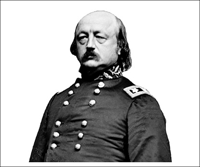 at death the soul of the deceased has to stand in the Hall of Judgment
before the god Osiris and his fellow gods.
The person’s heart is weighed by Anubis and recorded by Thoth.
Osiris makes no comment.
Then, quivering with fear, the soul watches the god weigh his
heart in the balance. On one
side is his heart. On the
other is the ostrich feather representing Maat, goddess of truth and
justice. If the heart is
found to be neither too heavy nor too light, the dead man is acquitted.
On the other hand, if the heart is found wanting the soul is immediately
devoured. This evening we
are going to judge Benjamin Butler.
at death the soul of the deceased has to stand in the Hall of Judgment
before the god Osiris and his fellow gods.
The person’s heart is weighed by Anubis and recorded by Thoth.
Osiris makes no comment.
Then, quivering with fear, the soul watches the god weigh his
heart in the balance. On one
side is his heart. On the
other is the ostrich feather representing Maat, goddess of truth and
justice. If the heart is
found to be neither too heavy nor too light, the dead man is acquitted.
On the other hand, if the heart is found wanting the soul is immediately
devoured. This evening we
are going to judge Benjamin Butler.
Those who wrote the
history of the war had their reasons for their dislike.
There were obvious dislikes for him in the South.
This was also true for any Union leader like Lincoln, Sherman, or
Grant. What is less obvious
was why Butler was despised in the North.
We will investigate some of his policies that are in favor today,
but not so much in Ben’s period.
He had some attributes that his opponents disliked; many of which
were on display during his life and followed his reputation to the
grave. Besides attributes,
he often stood for unpopular causes.
At the end, we, like Osiris will attempt to pass judgement.
First, and foremost,
Butler was a political “traitor.”
After all, he was a Democrat.
In the North, being a “war Democrats” meant being attacked.
The list was long to include McClellan, Stanton, and even Stephen
Douglas. This last figure
was the very “poster child” for the loyal Democrat.
After losing the election to Lincoln, he professed his support
for his rival and had a seat of honor at the inauguration.
Sadly, Douglas died shortly afterwards.
In 1860 Ben was condemned by the abolitionists.
Rewarded by the Secretary of War, Jefferson Davis, Butler became
a general in the United States Army.
This accompanied his appointment to the Board of Visitors at West
Point. During the war, this
was not seen as a plus.
There were three
things against Ben in the North.
First, the DC band was with him when he was on top, but dropped
like a hot stone when he was not.
Secondly, Ben did not go to West Point.
As if to rub it in, he was the youngest major general in the army
at the time he was promoted to that rank.
The “ring knockers” could not stand that.
And finally, it was claimed that old Ben was a terrible general
who did not win any battles.
This is not only false, but it is closely related to the last point.
It was a charge that the regular military often tossed at
political generals. You
might remember my defense of Lew Wallace.
In the South he was
despised for not supporting the “cause.”
In 1860 he attended the Democratic convention in Charleston, SC
as a member of the Massachusetts delegation.
There he supported first Douglas and then Jefferson Davis, who
was running as a moderate.
When the party split, northern members met in Baltimore where he helped
nominate Breckinridge.
In April of 1861 the
6th MA was passing
through that same city on
the way to reinforce Washington.
Mindful, that quick action to isolate the capital might force the
North to let the South go, gangs harassed that unit leaving four
soldiers dead. Butler was on
a ship heading up a force of soldiers when they were ordered to
Annapolis. Maryland governor
Thomas H. Hicks feared that Union troops anywhere in his state would
spark violence, and asked Butler to not put his regiment ashore.
Butler would have none of it.
He landed his troops and secured the railroad from there all the
way to Washington. This
allowed the 7th NY access to DC
which assured the safety of the city.
On April 27th Lincoln suspended
the writ of habeas corpus along the military supply line from
Philadelphia to Washington.
Butler, without orders, took the rest of his command and moved on Relay
House, a rail junction just to the north of Baltimore.
From there he occupied the city and insured the free flow of men
and material from the north to Washington.
After that, Maryland was never a threat to join the Confederacy.
However, General Winfield Scott was not pleased.
After Butler had taken Baltimore, he was the darling of everyone
in Washington except Scott.
When he appeared Butler was forced to stand at attention to report about
his insubordination. The
Lieutenant General broke into angry vituperations over the great and
needless risk Butler had run.
Butler waited, standing before him, until his patience had been
exhausted. Having already
decided to leave the Army if necessary, he turned on the old general and
gave him as good as he got.
History, sadly, has not recorded this “colorful” exchange.
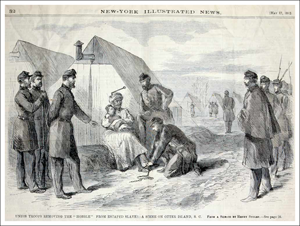 Butler was given
command of Fort Monroe, but Scott reduced Butler’s forces so he could
not go on the offense.
However, he was safe and secure inside the fort.
That fact was not lost on slaves working near the Union lines.
If a slave escaped, Butler would not follow the Fugitive Slave
Law of 1850 which required him to return the slave to his master.
Butler famously claimed that the slaves were not people, but
contraband of war. Like
Baltimore, Ben became a hero in DC when he and Commodore Silas Stringham
took a convoy of six ships and 860 men to Hatteras Inlet, NC.
There they captured two forts and 615 confederates.
This was the first victory since Bull Run.
He was rewarded by being selected to lead forces, together with
Farragut and Porter, against New Orleans. Butler was given
command of Fort Monroe, but Scott reduced Butler’s forces so he could
not go on the offense.
However, he was safe and secure inside the fort.
That fact was not lost on slaves working near the Union lines.
If a slave escaped, Butler would not follow the Fugitive Slave
Law of 1850 which required him to return the slave to his master.
Butler famously claimed that the slaves were not people, but
contraband of war. Like
Baltimore, Ben became a hero in DC when he and Commodore Silas Stringham
took a convoy of six ships and 860 men to Hatteras Inlet, NC.
There they captured two forts and 615 confederates.
This was the first victory since Bull Run.
He was rewarded by being selected to lead forces, together with
Farragut and Porter, against New Orleans.
The Navy got the
better of the forts on the Mississippi delta so the boats sailed on up
river and Butler captured the forts.
Then he joined Farragut sitting in the river with his guns all
aimed at New Orleans. Navy
men raised the American flag over the mint, but the next day
secessionist men hauled it down.
However, with the threat of absolute destruction of the city by
the guns of the fleet, the flag was raised again.
Most all of the citizens of the town were unable to accept
defeat, however, there was little they could do.
The women of New Orleans were particularly demonstrative in their
contempt for the soldiers.
Farragut was the victim of a chamber pot emptying.
In theory Butler believed in retaliation, but in this case he
pulled back. With the help
of his wife Sarah, Butler issued General Order No. 28 which said: “If
any woman should insult or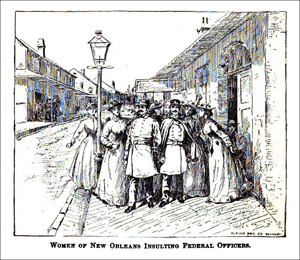 show contempt for any officer or soldier of the United States, she shall
be regarded and shall be held liable to be treated as a woman of the
town plying her avocation.”
The order produced the desired effect, as few women proved willing to
risk retaliation simply to protest the Union presence, but the order was
denounced in the North and the South as harsh.
show contempt for any officer or soldier of the United States, she shall
be regarded and shall be held liable to be treated as a woman of the
town plying her avocation.”
The order produced the desired effect, as few women proved willing to
risk retaliation simply to protest the Union presence, but the order was
denounced in the North and the South as harsh.
Ben Butler was a
pioneer in causes that are much in favor today.
We will now discuss these four points.
There is a common theme to them.
They all revolve around the common man.
Butler was a very rich man.
He first made money as a lawyer.
This hard-working young man had just passed the bar in 1840.
His success at the bar, laboring long hours, and choosing his
cases with care led to financial wellbeing and fame.
Many of his cases involved the mills of Lowell, MA.
He represented both sides, one time for the mill owners, another
time for the mill workers.
When a famous mill was on the market, Ben bought controlling interest in
the Middlesex Corporation.
Butler was an
“enlighten” factory owner.
He paid his workers good wages.
This did not endear him to the other owners.
And besides, Ben was a Democrat and they were Whigs or
Republicans. Not only had
Ben defended the 10-hour day in court, he practiced what he preached at
the bar. Rather than being
driven out of business by the competition, his mill made good money.
Now that he was an owner, do you think he gave up taking worker’s
case? He did not.
The workforce was changing about this time.
The “mill girls” were being replaced by the Irish immigrants.
When others would not take their cases, Butler did.
Not only did he have good clients, but he gained good workers and
good voters.
As was noted earlier,
he was in the lead with what we would call integration today.
Not only did he utilize the freedmen during his military service,
he supported the rights of the black man.
In 1866 he successfully ran for the House.
Although it was not popular in the conservative press back home,
Butler fought for equal political rights for Negroes.
In Congress he was the head of the Committee on Reconstruction.
That involvement led to the impeachment of President Andrew
Johnson. He was on the Board
of Managers for the impeachment.
Because of his past activities and skills, he was selected to
lead the prosecution. It is
beyond the scope of tonight’s presentation, but his work at the trial in
the Senate was masterful. He
lost by only one vote.
There is no
disagreement that Butler was smart.
Supporters pointed to this as a plus, detractors would say he was
diabolical. He was called
crafty, clever, crude, and unscrupulous.
Ben had a near photographic memory which was on display from the
time he learned how to talk.
Five months after his birth, his father died of yellow fever.
His mother relied on her own toil and the kindness of relatives.
At age nine, a neighbor wrote to the trustees of Phillips Exeter
suggesting that the school would be wise to offer Benjamin a full
scholarship. Master Butler
matriculated that fall.
However, in spite of good grades, feisty Ben could not help getting into
fights and left both intellectual and physical marks on the institution
and the other students. As a
result, by January he left the school and set out with his mother for
Lowell. He attended public
school in Lowell. He was
almost expelled for fighting.
Next, he attended Waterville (now Colby) College in pursuit of
his mother's wish that he prepares for the ministry, but eventually
rebelled against the idea.
After graduation he read the law which sharpened his already strong
rhetorical skills.
Ben was a workaholic;
no one will deny that. A
positive example of this comes in his first year of practicing law.
Congress just passed the bankruptcy act.
It was clear to him that there would be many cases to try.
So, in addition to his normal workload, he devoted all his free
time, and some of his sleep time, to boning up on the new law.
It paid off handsomely.
In a negative light, Butler quickly gained a reputation as a
dogged criminal defense lawyer who seized on every misstep of his
opposition to gain victories for his clients.
Often these errors were because the lawyer on the other side was
lazy.
Keeping a paper trail
was most important. He kept
meticulous records. While in
New Orleans, Butler was believed by many of personally profiting from
his position. These folks
would have relished the sight of old Ben being brought up on charges.
This never happened because he crossed all his “Ts” and dotted
all his “Is.” For example,
even before he got to New Orleans, he and his force was positioned on
Ship Island at the mouth of the Mississippi ready to attack the forts.
In order to get men and material off the ocean-going ships the
command needed small boats or lighters.
The Navy had captured a blockade runner loaded with $5,000.00
worth of cotton. On the
island the quartermaster’s civilian laborers were almost in a state of
mutiny for lack of pay. He
needed those men and their boats to offload his stuff.
The rules stated that the captured cotton should be sent to
Boston to await adjudication as prize money.
This would have taken months and the money would have gone to the
Navy anyway.
What Ben did was
brilliant, expedient, and probably extra-legal.
Because he documented every step, he was never in legal hot
water; no one even tried.
First, he put the cotton on a ship which was to return to Boston empty.
He consigned the cargo to his own broker, Richard S. Fay, Jr.
Next, he borrowed $4,000.00 from a sutler on the island.
Those funds paid the laborers their wages.
They then offloaded Butler’s ships.
When Fay made the private sale of the cotton, he sent the funds
south and Ben repaid the loan to the sutler.
As much as Benjamin
Butler’s opponents would have wished otherwise, he was honest and could
not be bribed. While this
seems to be true, like so many aspects of his life, it depends on how
historians, you, or Ben look at the facts.
There is no doubt he was, for lack of a better word, wily.
In a positive light wily is a synonym for smart.
But, in a darker view wily could mean dishonest.
As you will learn in the conclusion, I believe he was honest,
only because I could not find any credible evidence of the opposite.
However, keep in mind that absence of evidence is not evidence of
absence.
To say that Ben was
outspoken is the height of understatement.
His opponents said he was rude, crude, and a bore to boot.
As a lawyer, being disrespectful of a judge in his own courtroom
is not a recipe for success at the bar.
One of Butler’s cases in the Lowell Police Court, our boy was
fighting for reform of that court.
He had a dislike for Justice Nathan Crosby, the presiding officer
of that court. Crosby jailed
Butler for contempt of court in “threatening violence to the person of
said Justice by using menacing gestures and insulting attitudes toward
said Justice in his presence and view.”
After cooling his heals in jail for a week, Ben appeared before
Chief Justice Lemuel Shaw under a writ of habeas corpus.
Where upon he pleaded “if, in the heat of defending his client,
he had used any improper expression, he regretted it.”
The pugnacious
Benjamin Butler was a fighter, both literally and figurately, all his
life. As mentioned earlier,
he picked fights with his classmates at school and got tossed out of
school because of same. As a
young lawyer he fought professionally at the bar and jousted with fellow
barristers and judges alike.
He fought for causes all his life, some popular and some not so much.
In the army, where he was being paid to fight, he waged war on
the front, in the rear area, and with anyone with whom he saw as the
enemy. It did not matter
whether they wore blue, gray, or civilian clothes.
Why Butler, who was
extremely intelligent and hardworking, chose to pick fights is an open
question. It is hard to do a
psychoanalysis from the 21st century looking back
to a person from the 19th.
Even if I were schooled in psychology, which I am not, this is an
impossible task. I have seen
nothing in my study of him that really tries to explain this.
Often his friends urged him to tone it back in public.
In private Butler acknowledged the justice of this criticism, but
in the heat of debate he usually forgot moderation.
If he was truly an outstanding politician, in the professional
sense of the word, he would have moderated his behavior.
After all, both he and supporters, wanted him to run for
President.
As to the causes he
supported, let’s look at three.
First, as a pre-war Democrat, it is not surprising that he was in
favor of soft money.
However, when he became a Republican during the war, he still favored
easy credit and fought the gold standard.
As a newly elected congressman, he threw in his lot with the
advocates of greenback paper money.
This was cheap money for the masses, easy credit for the farmers,
and an abomination to the bankers.
For this stand, and for other things, Benjamin Butler was never
popular with establishment Republicans.
Second, his support
for the recently liberated slaves grew out of Butler’s long history of
support for the working poor and his more recent war experience with
“contraband.” He, himself,
selected civil rights as the cornerstone of his congressional career.
In fact, the term civil rights gained its modern meaning in the
Civil Rights Act of 1871.
Butler wrote the first draft of this bill which did not pass.
A second version of it, only slightly less sweeping, did pass
Congress and was signed by President Grant.
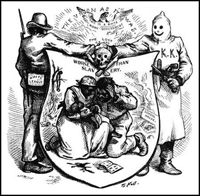 And
finally, Butler had led the fight against the Ku Klux Klan.
In 1870 he instigated an investigation into the organization.
In the next year, a state Grand Jury reported that: "There has
existed since 1868, in many counties of the state, an organization known
as the Ku Klux Klan, or Invisible Empire of the South, which embraces in
its membership a large proportion of the white population of every
profession and class. The
Klan has a constitution and bylaws, which provides, among other things,
that each member shall furnish him-self with a pistol, a Ku Klux gown,
and a signal instrument. The
operations of the Klan are executed in the night and are invariably
directed against members of the Republican Party.
The Klan is inflicting summary vengeance on the colored citizens
of these citizens by breaking into their houses at the dead of night,
dragging them from their beds, torturing them in the most inhuman
manner, and in many instances murdering." And
finally, Butler had led the fight against the Ku Klux Klan.
In 1870 he instigated an investigation into the organization.
In the next year, a state Grand Jury reported that: "There has
existed since 1868, in many counties of the state, an organization known
as the Ku Klux Klan, or Invisible Empire of the South, which embraces in
its membership a large proportion of the white population of every
profession and class. The
Klan has a constitution and bylaws, which provides, among other things,
that each member shall furnish him-self with a pistol, a Ku Klux gown,
and a signal instrument. The
operations of the Klan are executed in the night and are invariably
directed against members of the Republican Party.
The Klan is inflicting summary vengeance on the colored citizens
of these citizens by breaking into their houses at the dead of night,
dragging them from their beds, torturing them in the most inhuman
manner, and in many instances murdering."
Butler came into
possession of a blood-stained shirt from a victim, who was a white
veteran of the war, of a Klan lashing.
Before the House, Congressman Butler brandished this item as if
it had been evidence in a trail.
He shook the bloody shirt before his fellow congressmen.
And thus, the expression “waving the bloody shirt” entered into
the political language.
You can probably
guess what my conclusion will be.
As you have undoubtably noted, this has not been a regurgitated
the false claims of the lost cause bunch.
I do think that Benjamin F. Butler got a raw deal in his day, in
the intervening years, and even today.
He was no saint, but who during the 19th century was?
With our advantage of hindsight, one can see, as presented, many
of the things we see as modern thought that can trace their roots back
to Ben. If you can look past
his style, we should give him more credit than most historians do.
Here was a Democrat
who fought for the Republicans and actually got many of them won over to
his brand of liberal social issues.
Limited worker hours is just the most obvious gift of his battles
with the establishment. Ben
worked hard for his beliefs and accomplished more in a day than most
people do in a week. In
addition, while being clever he was honest.
In his first encounter in Baltimore he succeeded by taking action
when preparation met opportunity.
From early in the
Civil War to the end of his life he defended, utilized, and promoted the
wellbeing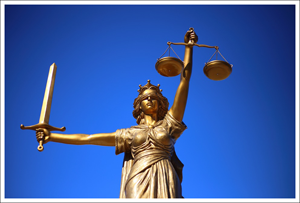 of the black citizens of the United States.
Except for Lincoln’s pen, this man’s action did more for civil
rights than any leader of his day.
He is the classic case of a leader who “put his money where his
mouth was.” Evidence for
this goes back to his mill ownership days, extends forward to his
actions in New Orleans, and continued on for the rest of his life.
He fought for the things that we think are worth fighting for,
such as opposing the Klan.
of the black citizens of the United States.
Except for Lincoln’s pen, this man’s action did more for civil
rights than any leader of his day.
He is the classic case of a leader who “put his money where his
mouth was.” Evidence for
this goes back to his mill ownership days, extends forward to his
actions in New Orleans, and continued on for the rest of his life.
He fought for the things that we think are worth fighting for,
such as opposing the Klan.
In summing up Butler,
it is useful to reflect on what Grant, no help to Ben during the war,
said about him on his world tour after war.
“I had always found General Butler a likeable, able, and
patriotic man of courage, honor, and sincere conviction.
He was, never the less, a man it is the fashion to abuse.”
Last changed: 12/03/19 |

